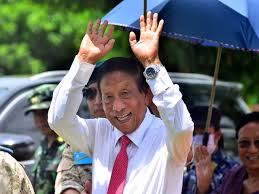The Role of Thuingaleng Muivah in Northeast India

Introduction
Thuingaleng Muivah is a prominent figure in Indian politics, particularly noteworthy for his role in negotiating peace and fostering dialogue in the Northeast region. As a leader of the National Socialist Council of Nagalim (Isak-Muivah), he has been instrumental in addressing long-standing issues related to ethnic identity, autonomy, and regional development.
Historical Context
Born on November 25, 1932, in the Sazo area of Nagaland, Muivah has played a pivotal role in the Naga nationalist movement since the 1960s. His leadership has significantly influenced the political landscape, particularly regarding the Naga peace talks with the Indian government. The conflict has roots in the demand for a separate Naga land and autonomy, leading to years of altercations and negotiations.
Recent Developments
In recent years, Muivah has been at the forefront of peace negotiations aimed at ending decades of strife. The 2015 Framework Agreement, signed between the NSCN (IM) and the Government of India, marked a significant milestone in the reconciliation process. Although challenges remain, including divergent views among various Naga factions and the Indian government’s stance, Muivah continues to advocate for a comprehensive settlement that respects Naga aspirations.
Impact on Regional Harmony
Muivah’s commitment to peace has led to increased dialogue among different Naga groups and with the central government. His efforts highlight the importance of understanding and cooperation in resolving conflicts. The positive engagement from various stakeholders has paved the way for enhanced development initiatives in the region, fostering a sense of hope and collaboration among communities.
Conclusion
Thuingaleng Muivah remains a crucial figure in the peace process of Northeast India. His leadership illustrates the complexities of negotiating autonomy and identity in a diverse cultural landscape. Looking ahead, the continued dialogue and potential resolutions could not only transform Naga society but also serve as a blueprint for other regions facing similar conflicts. For readers, understanding Muivah’s role offers insight into the dynamics of regional politics and the ongoing journey toward peace in the Northeast.









